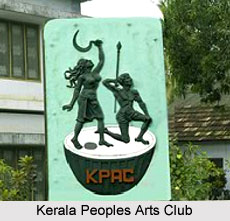 Kerala Peoples Arts Club or KPAC can be called as a politically motivated organization. This was shaped and spearheaded a new trend in Malayalam theatre during the 1950s. It was inspired by the Indian People`s Theatre Association, at that time engaged in using theatre as a tool of social change and in that process revolutionizing the art.
Kerala Peoples Arts Club or KPAC can be called as a politically motivated organization. This was shaped and spearheaded a new trend in Malayalam theatre during the 1950s. It was inspired by the Indian People`s Theatre Association, at that time engaged in using theatre as a tool of social change and in that process revolutionizing the art.
Playgoers enthusiastically received the KPAC`s second production, Ningalenne Communistakki i.e. "You Made Me a Communist" in 1952. This was by writer-director Thoppil Bhasi. It entertained the masses wherever it was performed. At the same time it served as an effective means of propaganda for the revolutionary movement behind it. The narrative projected the problems of social injustice and exploitation, emphasizing their human aspects. The incorporation of melodrama, music, and humour, popular in the Sangitanataka tradition, characterized its presentation. Bhasi adapted Sangitanataka`s basic form to suit ideological requirements, making it the vehicle of strong content. But the manner of production, especially the acting style and stage settings, aimed at creating an illusion of natural happenings, giving a realistic appearance that differentiated it from Sangitanataka.
The success of this play prompted the KPAC and Bhasi to rely on this structure to stage various types of drama besides the political, like Asvamedham i.e. "Horse Sacrifice" in 1962 dealt with social issues of a general nature. In course of time, most organized troupes in Kerala began to follow this model, which became the trend in the so-called professional theatre owing to its popularity. The KPAC itself presented an adaptation of Sudraka`s Sanskrit classic Mricchakatika in 1985 in this form. Admittedly, the style is formula-based, but the KPAC can claim the credit for making it purposeful and at the same time entertaining.
This article is a stub. You can enrich by adding more information to it. Send your Write Up to content@indianetzone.com




















